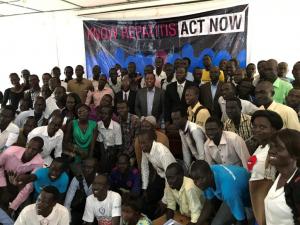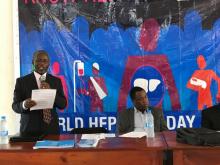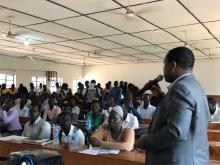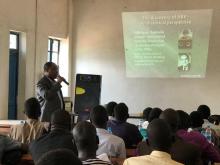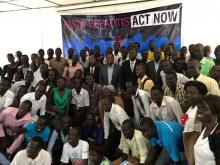South Sudan marks World Hepatitis Day 2017
Juba, 28 July 2017 – South Sudan has joined the rest of the world in commemorating World Hepatitis Day under the theme “Eliminate Hepatitis” on 28 July 2017, at the University of Juba, college of medicine.
The campaign kicked off on 24 July 2017 with a series of TV and Radio talk shows to create awareness about the different forms of hepatitis; the risks involved in transmitting the infection; how the infection is transmitted; who is at risk; how do we prevent it and seek for treatment.
The public lecture at the University of Juba including discussions, question and answer session on the common causes of hepatitis, prevention and control marked the commemoration of the day. Challenges in the context of the country and achievements so far related to hepatitis prevention, treatment and control was discussed.
Dr Pinyi Nyimol Mawien, the Director General for Preventive Health Services at the Ministry of Health, highlighted the National Hepatitis disease trends, the burden and encouraged participants to get involved in raising awareness on the prevention the diseases.
The address of the WHO Regional Director for Africa, Dr Matshidiso Moeti was read by Mr James Chitsva, on behalf of Dr Abdulmumini Usman, the WHO Representative to South Sudan. In the speech, Dr Moeti called on international partners, civil society, and the private sector to support the regional hepatitis response by promoting awareness, advocating for adequate investments and working with Member States to implement the key prevention and treatment interventions.
Viral hepatitis is caused by five distinct hepatitis viruses known as Hepatitis A, B, C, D and E. Viral hepatitis is the eighth - highest cause of mortality globally. The infection from these viruses affects approximately 500 million people worldwide, and if left untreated Hepatitis B and C could result into chronic liver disease like liver cancer or cirrhosis.
The disease results in approximately 1.45 million deaths each year - a toll comparable to that of HIV and tuberculosis. Of those deaths, approximately 55% are attributable to hepatitis B virus (HBV), 35% to hepatitis C virus (HCV) and the remainder to hepatitis A (HAV) and hepatitis E (HEV).
Viral hepatitis is also growing cause of mortality among people living with HIV. About 5–15% of all people living with HIV are co-infected with HCV and 5–20% with HBV.
South Sudan has all forms of Hepatitis, particularly outbreaks of Hepatitis E Virus (HEV) have been reported in Lakes, Unity and Upper Nile states, especially among refugees and internally displaced populations.
“Viral hepatitis can be eliminated”, says Dr Usman. With the inclusion of viral hepatitis in the Sustainable Development Goals (SDGs) and the recent adoption of the world’s first global hepatitis strategy, which set a goal of eliminating viral hepatitis by 2030, “WHO is committed to support the Ministry of Health to eliminate hepatitis in South Sudan. WHO currently supports development of national treatment and care guidelines for Hepatitis C and B and the development of national plan for Hepatitis control.
The event was attended by officials from the Ministry of Health, staff of the World Health Organization, Health professionals, students from the University of Juba and the media among others.
Tel: +211955045050
Email: ngandam [at] who.int (ngandam[at]who[dot]int)
Communications Officer
WHO Rwanda
Mobile: +250 795 450 856
Email: ebrahimj [at] who.int (ebrahimj[at]who[dot]int)



